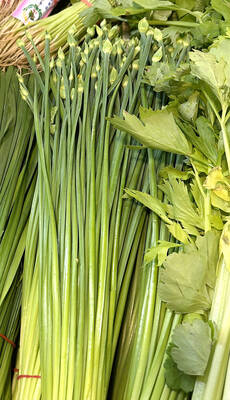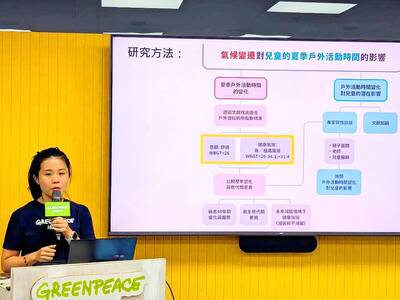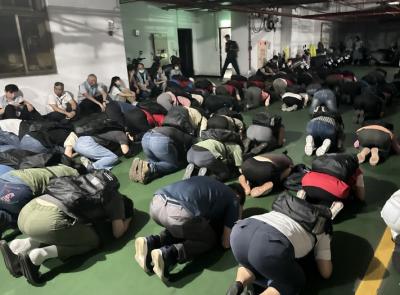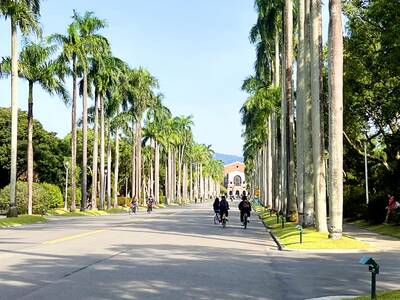Department of Health (DOH) officials announced yesterday that samples from three types of food product suspected of causing botulism infections tested negative for the botulinum toxin after an initial round of laboratory tests.
The three food products were packaged mushrooms brewed in soy sauce, dried beancurd and packaged vegetarian braised fatty pork produced by Cheng Hsiang Foods in Taoyuan County, Food and Drug Administration (FDA) Section Chief Tsai Shu-chen (蔡淑貞) said.
Health authorities also recalled more than 2,200 packs of dried beancurd and other soybean foodstuffs produced by Cheng Hsiang yesterday, after recent reports that several people had been poisoned by botulism as a result of eating the products.
BOTULISM PROBE
Cheng Hsiang’s production facilities and products have been under investigation by health authorities since a woman and her mother-in-law were allegedly poisoned by botulism after consuming products made by the company.
The dried beancurd involved in the latest case was the same product involved in a case of botulism infection last month in which a woman died and another became seriously ill after consuming dried beancurd and preserved oysters.
Botulism is caused by a nerve toxin produced by the clostridium botulinum bacteria.
Cheng Hsiang shut down its operations on April 14. However, health authorities said that the firm had hidden the fact that it manufactures food products for another company in Dasi Township (大溪), Taoyuan County.
MEETING
Health authorities said they would meet today with representatives from the companies involved in the supply chain of dried beancurd products to review operating procedures and discuss ways to improve sanitary conditions and refrigeration of foodstuffs. The firms could face further product recalls, officials said.
The FDA said that as the country enters the rainy season, the high humidity combined with high temperatures could easily spur growth of bacteria and cause foodstuffs to spoil more quickly. Consumers are advised against purchasing unrefrigerated food products that are supposed to be kept refrigerated in order to minimize the risk of food poisoning.

The Taipei Department of Health’s latest inspection of fresh fruit and vegetables sold in local markets revealed a 25 percent failure rate, with most contraventions involving excessive pesticide residues, while two durians were also found to contain heavy metal cadmium at levels exceeding safety limits. Health Food and Drug Division Director Lin Kuan-chen (林冠蓁) yesterday said the agency routinely conducts inspections of fresh produce sold at traditional markets, supermarkets, hypermarkets, retail outlets and restaurants, testing for pesticide residues and other harmful substances. In its most recent inspection, conducted in May, the department randomly collected 52 samples from various locations, with testing showing

The government should improve children’s outdoor spaces and accelerate carbon reduction programs, as the risk of heat-related injury due to high summer temperatures rises each year, Greenpeace told a news conference yesterday. Greenpeace examined summer temperatures in Taipei, New Taipei City, Taoyuan, Hsinchu City, Taichung, Tainan and Kaohsiung to determine the effects of high temperatures and climate change on children’s outdoor activities, citing data garnered by China Medical University, which defines a wet-bulb globe temperature (WBGT) of 29°C or higher as posing the risk of heat-related injury. According to the Central Weather Administration, WBGT, commonly referred to as the heat index, estimates

Taipei and other northern cities are to host air-raid drills from 1:30pm to 2pm tomorrow as part of urban resilience drills held alongside the Han Kuang exercises, Taiwan’s largest annual military exercises. Taipei, New Taipei City, Keelung, Taoyuan, Yilan County, Hsinchu City and Hsinchu County are to hold the annual Wanan air defense exercise tomorrow, following similar drills held in central and southern Taiwan yesterday and today respectively. The Taipei Mass Rapid Transit (MRT) and Maokong Gondola are to run as usual, although stations and passenger parking lots would have an “entry only, no exit” policy once air raid sirens sound, Taipei

Taipei placed 14th in the Quacquarelli Symonds (QS) Best Student Cities 2026 list, its highest ever, according to results released yesterday. With an overall score of 89.1, the city climbed 12 places from the previous year, surpassing its previous best ranking of 17th in 2019. Taipei is “one of Asia’s leading higher-education hubs,” with strong employer activity scores and students “enjoying their experience of the city and often keen to stay after graduation,” a QS staff writer said. In addition to Taipei, Hsinchu (71st), Tainan (92nd), Taichung (113th) and Taoyuan (130th) also made QS’ list of the top 150 student cities. Hsinchu showed the